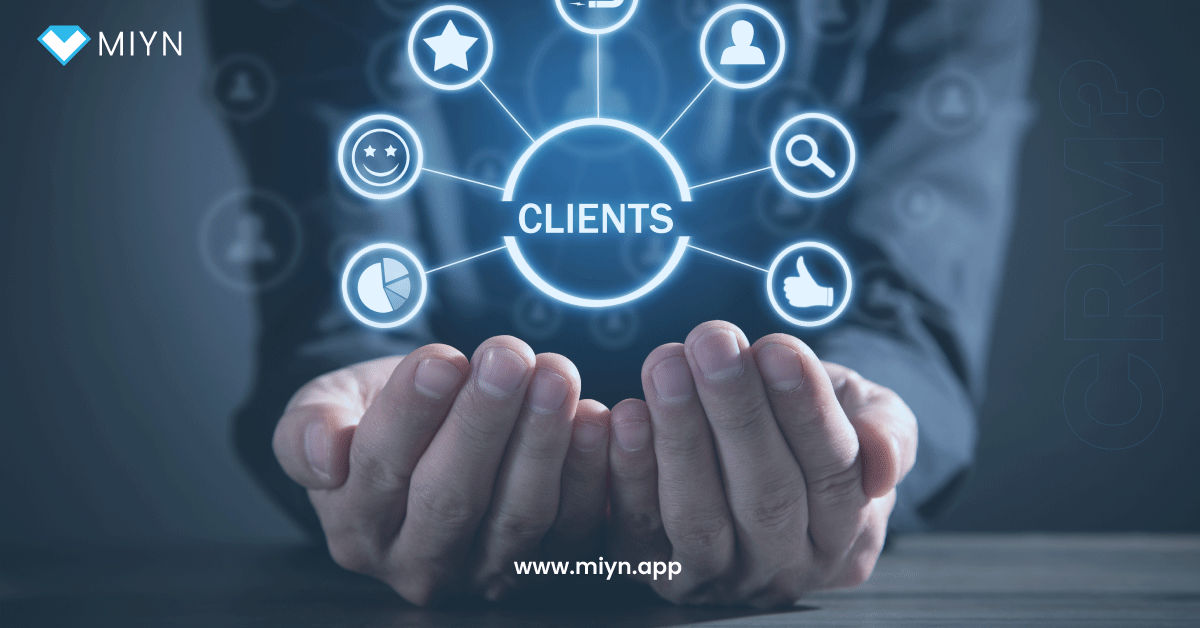What is CRM? Customer Relationship Management System Meaning Defined
CRM is abbreviated as Customer Relationship management System.
It is obvious by name that a CRM will help you with customer relations management. Which is a necessity for any business.
A strong marketing strategy will help you find new customers. But, it will be your responsibility to maintain a good relationship with them. If you are not focusing on customer relationships then you are slowing down your progress. This is a fact, because a regular is just like a free brand ambassador.
Since you will be interacting with thousands of customers, it gets difficult to keep track of all of them. This is where the role of CRM comes in. It will store the details of all the customers. Which can include their contact details and some personal information. The personal information can include date of birth. Such information will help you to build emotional trust with your clients.
The main purpose of CRM is to generate more sales, market your brand, and improve services. Thus a consumer relationship management can improve the productivity of your business.
And in this article we are going to inform you everything about CRMs. So just explore the article to get enlightened about CRMs.
Brief History of CRM
The term CRM is new. But customer relations management is as old as the beginning of trade. Which can take you several years back. Yet the digital CRM was born in the 1980s. In these four decades the customer relations management has gone under a variety of changes. It was not even close to the CRM we know today.
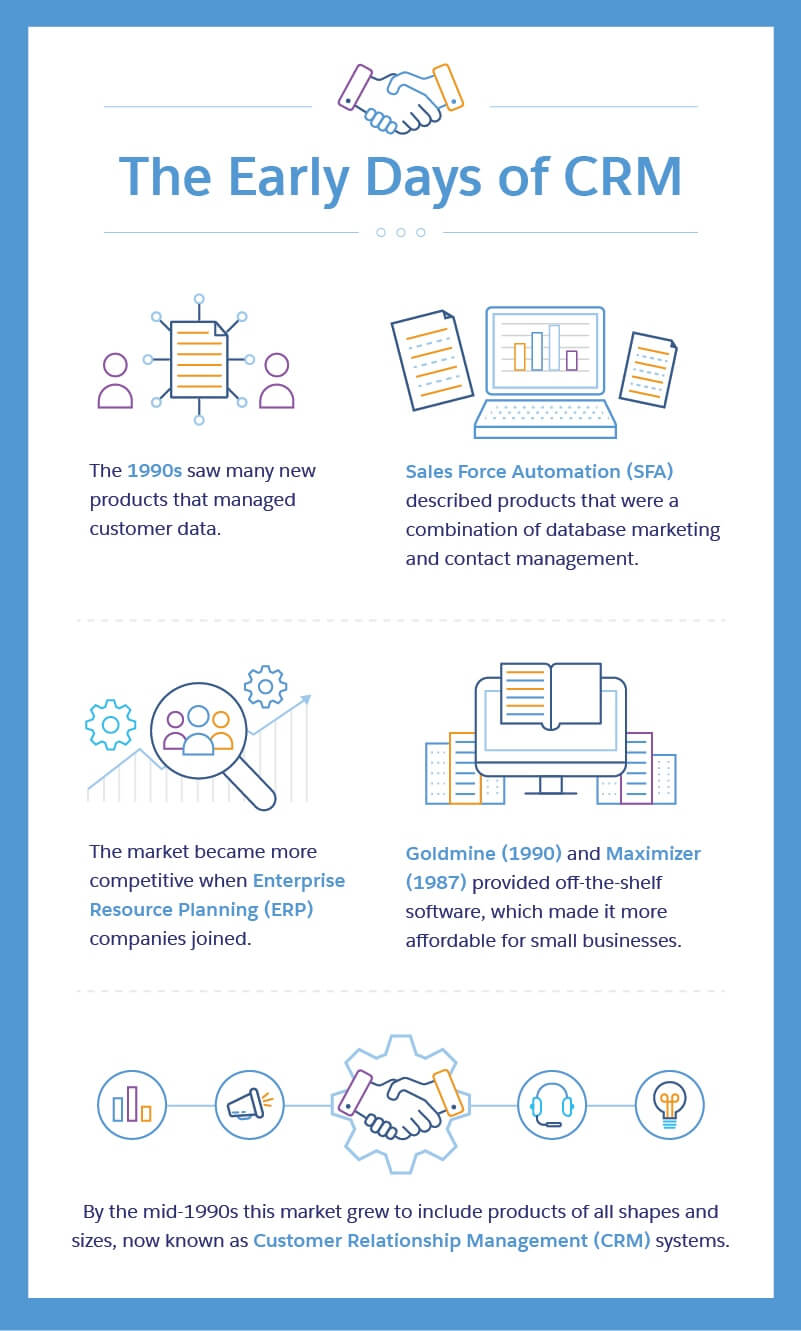
Robert and Kate Kestnbaum are known as the pioneers of CRM software. They used the database to store the data of customers. The stats of the data were analyzed to improve the communication with potential customers.
You can say that it was just a collection of information about customers.
The decade of the 90s was an important decade for the growth of CRMs. The Brock Control Systems were able to combine contact management software with sales force automation also known as SFA.
SFA was a smart form of older CRM. Its database marketing was more automated, which was combined with contact management. And it was able to dig up more useful information about customers. Its availability made businesses more productive as it was also automating tasks like sales tasks and inventory control.
This decade came to an end with the birth of the first SaaS CRM, that is Salesforce. But it was ignored by large vendors in its initial years.
Get Started freeBut back in those days it was not easy to implement CRM. It was essential to have good knowledge of technology before installing it. Luckily now we have cloud-based CRMs. That can be used by anyone who can use a keyboard and a mouse.
The first cloud customer relations management was launched in 2007 by salesforce. And now they are simpler and cheaper. Thus, you can get one without saving a big budget.
Who needs CRM?
If you are related to the business by any means then you need a CRM. Either you are running an e-commerce business or you are a freelancer you should use CRM. And the need increases more if you are running a small business, mid-size business or enterprise-level corporation.
You need CRM because it can centralize task management and it can also automate many tasks. We can see that many of the companies are now working remotely. And your company can also hire remote employees. So, you should have such a tool that can place the process of your work in one place. And it should allow you to access it via the cloud. This tool will allow you to grow as quickly as possible. But without a centralized tool, you will slow down.
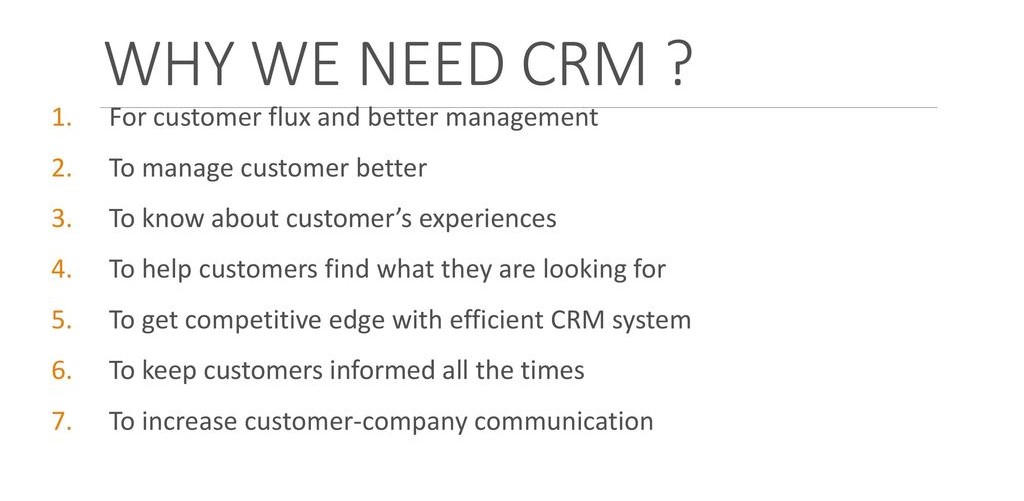
Moreover, the competition in the online environment is becoming intense constantly. But if you use CRM you will have a certain benefit. Because it will get rid of repetitive tasks, and it will allow you to use human strength on more important tasks.
If you are still not using CRM then you may not be able to move ahead of your competitors. We can say that because now 74% of the companies are using a CRM. And 91% of companies with at least 11 employees are using this technology.
Working of CRM
CRMs are designed to improve your sales. And secure the current clients for a longer collaboration. They collect data about your clients from social platforms, your website traffic, voice calls and other channels. Furthermore, the CRM becomes a centralized platform to organize business processes and workflows.
Remember the most important features of any CRM are marketing, sales force automation, project management and collecting contacts. Without these features the CRMs are useless.
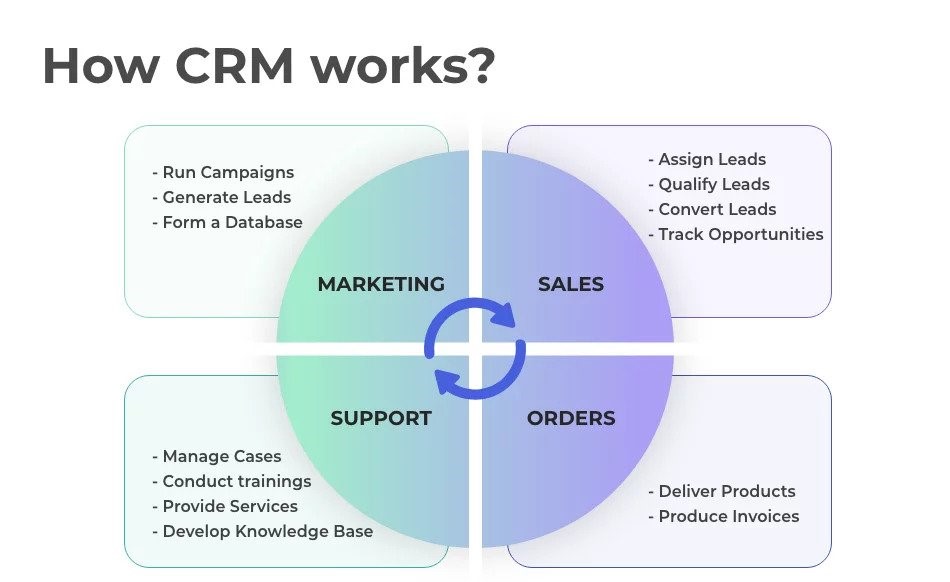
Now, before you install a CRM you should know the behavior of your business. Yes, there are numerous CRMs available but all of them have different ways of working. But if you are unaware of your business strategy then the CRM you are thinking to install can disappoint you.
This is why we are going to inform you about the basics of CRM. Also, we will discuss different types of CRMs. Just scroll down to know about them.
Basics of CRM
The main purpose of CRMs is to improve customer service, sales process and marketing campaigns. And this goal is achieved by improving the efficiency of workflow, sales pipeline, analyzing data and automating tasks.
The perfect CRM strategy will provide one complete solution for managing the voice of your team, emails and chat. And they keep track of customer needs, leads, conversion and offers in one place. Moreover, you can also use them to optimize websites and run ad campaigns.
As a result, you will see gradual growth in your business.
The modern CRMs will provide the advantage of automating tasks. Once you allow machine learning and analytics to do some of the work, you can save yourself from distressing. Thus CRMs can also help you to move towards a healthy life.
It was never easy to follow up with old or new customers. But now with the help of CRMs, you can keep track of all the contacts from a single location. With this centralized information, you can easily communicate with all of your customers.
Furthermore, the click to call feature allows you to call from anywhere and anytime. It is just not quick, it is also cost-friendly.
Email integration accelerates the sales process right from your inbox. Just sync your Gmail with CRM and communicate with clients and close more deals.
Types of CRM
As mentioned above, there are different kinds of CRM systems for different businesses. And now we are going to explore them one by one.
CRM for Sales
CRMs are primarily intended for the purpose of selling products. However, some of them place a strong focus on the sales cycle and include sophisticated tools aimed specifically at improving conversions.
A sales CRM manages the whole sales process from start to finish, including sales leads, sales procedures, and sales personnel. It enables you to create a sales pipeline, track leads, and gain a lot more visibility into sales prospects. On a single platform, you’ll be able to streamline your workflow and manage your customer-facing phone, chat, social media, and email touchpoints.
An all-in-one sales CRM is ideal for efficiently managing all aspects of sales. This comprises accounts, quotes, and proposals, as well as leads, contacts, and opportunities.
Lead management and contact management software take data from email, social media, phone conversations, and other sources, combining it to create unique, complex profiles of the individuals in your company’s circle.
Get Started freeYou’ll be able to monitor where a client is in the sales cycle with a Sales CRM, and nurture leads by sending them relevant, personalized information. Features like opportunity management help you notice sales as they happen so you can respond at the proper moment.
So, if you are looking to increase sales then go after a sales customer relationship management system.
CRM for improving Service
Customer service has never been more vital. a product or service CRM combines features from specialist customer service and support (CSS) software with marketing and sales to handle the full range of client interactions.
You will need such a CRM if you are looking to collect information about your customers. And this knowledge is used in sales and marketing to improve customer service. Moreover, the quick access to data will help you to solve customer queries quickly.
A service CRM system provides rapid access to client information across all key channels to service and support workers.
Every component of your CRM collects client data, including case history. And ensures that all of your service agents have complete insight into the individuals with whom they’re dealing. This reduces customer dissatisfaction and speeds up responses, lowering churn and increasing conversions.
A customer-centric CRM produces a ‘ticket’ when a consumer contacts you via one of your channels. The ticket includes the customer’s name, contact information, and the nature of their problem. And it also highlights proper departments based on the problem to ensure they talk with the proper person.
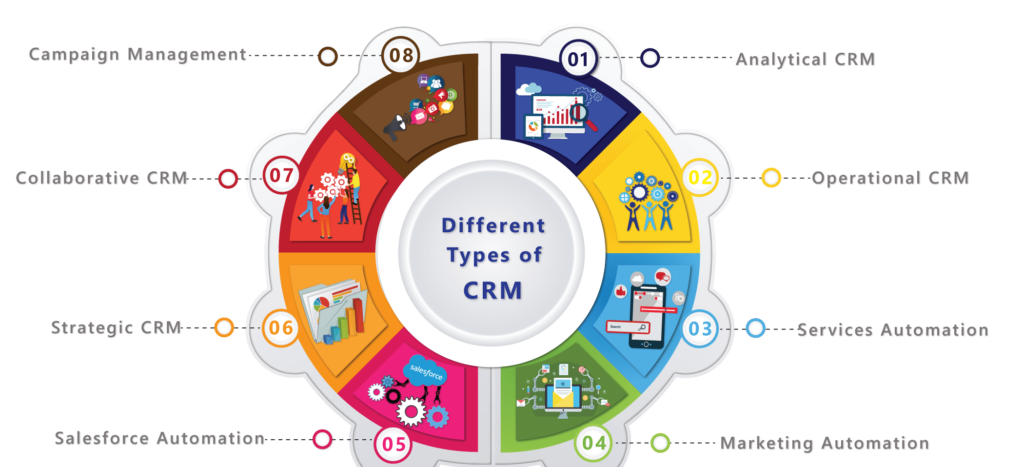
CRM for Marketing
Marketing has distinct problems and plays a distinctive “frontline” position in your company. A marketing CRM system can become a great tool for your business.
Any successful customer relationship management CRM system is based on the principles of improved business via overlapping communication and task and data centralization.
In that vein, a marketing-focused CRM can greatly assist with marketing by symbiotically blending it with sales, allowing you to conduct more successful campaigns, generate more leads, and complete more transactions.
Through marketing CRMs you can create marketing campaigns and automate them across media. It can also show you stats about opened/unopened mail, click-through rate, and A/B testing to determine the ideal landing page approach.
A marketing CRM may categorize leads based on how long clients stayed on your site, which links they visited, and what personal information they provided on a form. Marketing segmentation enables you to create various campaigns for different groups, ensuring that your brand remains “top-of-mind” until the lead is ready to act.
Integrations with technologies like Mail-chimp can aid you with email and SMS delivery automation, as well as the creation of social media advertisements. Drip marketing tools allow you to send a series of emails over a predetermined period of time.
CRM for Small business
Well, there is no certain CRM for small businesses. But some of them do have certain features that can improve the productivity of small teams.
If you are in such a condition then choose a CRM with good workflow, automating features and reporting. Moreover, it should have an easy to use interface. Since we use CRM for saving time, a difficult interface will waste a lot of your time.
Most likely, you may not require many app connectors. At the onset, integrations with your email platform, document editing software, and social media platforms should suffice.
CRM for Social platforms
The consumer journey nowadays is complicated. People have an unbelievable amount of options. And they are increasingly relying on word of mouth from their social networks to make decisions. Personal referrals are more likely than direct promotion to bring your goods to the public’s attention.
Advertising, consumer interaction, and connection with the general public have all benefited from the use of social media networks. As a result, social CRM has grown in popularity, aggregating and analyzing postings from Facebook, Twitter, Instagram, and other social media platforms.
As the influence of social media in business has grown, so has competition. Another key problem is keeping up with changes in internet behavior.
As a result, social media management has become a necessary corporate investment.
Traditional customer relationship management (CRM) relies on communication channels such as phone, email, and text. Social CRM extends this definition to include social networking sites such as Facebook, Instagram, Twitter, and LinkedIn. Which all have messaging modules that allow consumers and companies to communicate directly with one another.
A social CRM translates to a faster and more effective technique of responding to any consumer input, whether good or negative, for customer care and support. Posts from different social media are consolidated into one location, allowing you to stay on top of what’s going on with customers, leads, and the general public in real-time.
CRM for Mobile devices
The days of the 9-to-5 desk worker are rapidly vanishing. Meanwhile, mobile devices account for more than half of all internet traffic. Investing in a mobile CRM is a good decision for an agile team with a flexible schedule and who are frequently on the road.
Mobile CRMs are similar to classic CRMs but they can be accessed through tablets and smartphones. The best of the lot make the most of the format by providing easy-to-use user interfaces as well as robust analytics and communication features.
A mobile CRM platform should allow you to access most of the data that the online app delivers. You’ll also be able to add fresh data on the fly.
Sales staff needs to be able to rapidly answer calls from customers and prospects when they’re out of the office, thanks to in-app contact history and product information.
For everyone else in your company, having access to all of your data at any time and from any location is extremely beneficial to every department. From marketing to customer service to intra-team cooperation.
Get Started freeIt should be highlighted that utilizing a mobile CRM has a particular security risk. If you’ve ever had your phone fall out of your pocket on a crowded subway vehicle, you know that losing a smartphone is far simpler than losing a laptop.
With this in mind, make sure you pick a mobile CRM that has security features like two-factor authentication or VPN requirements.
Features of good CRM
Contact management
A critical CRM component is contact management, which is often known as customer management software. It lets users manage and better cater to their contacts by segmenting them into groups.
With this CRM feature, you’ll be able to collect vital consumer information and improve your marketing strategy while launching new goods.
It also enhances the personalization of all client interactions, making them feel valued and cared for. This is an important aspect of client happiness!
Sales team and customer management
A basic element of CRM is quantifying the possibilities that your sales team has with clients. Lead scoring is a technique that helps users to identify clients who are most likely to convert. This aids in the streamlining of sales and marketing teams, as well as the improvement of efficiency and the optimization of your sales process.
Lead Management for Determining High-Quality Leads
Without including lead management, no CRM feature list would be complete. Based on demographic and psychographic variables, this technology helps a company to identify the best clients to follow up with. It boosts your sales team’s efficiency and production by allowing them to focus on the correct leads at the right time, similar to lead scoring.
Reports and Dashboards
BI, reporting, and dashboards were formerly restricted to business intelligence products, but they’ve now become some of the most popular CRM capabilities. Customized reports and dashboards allow users to see information in a very visual, engaging way.
They provide real-time data updates and a platform that can be accessed through a range of portals, making it easier for a variety of employees to access. These reports may be used by management to make data-driven choices; investing in CRM BI is an investment in your company’s future.
Sales Analytics
When it comes to reporting, one of the most useful components of a CRM is sales analytics. By examining the hard facts from previous efforts, users may build stronger sales campaigns in the future. CRM software allows you to collect data from social media, surveys, and website visitors, then analyze it all in one place.
Sales Forecasting
Choosing a success metric is an important component of customer relationship management. Forecasting allows you to establish a standard against which you may assess if your outcomes are in line with your efforts. You may also use this information to figure out where you should focus your future efforts.
Email Client Integration
Within your CRM user interface, you can now obtain all of the automation and structure of a separate email client. Don’t rely on Outlook or IBM Notes; instead, pick a CRM that can do double duty. When a customer phones for help, your salespeople can quickly access their prior interactions and information to provide them with the best possible service.
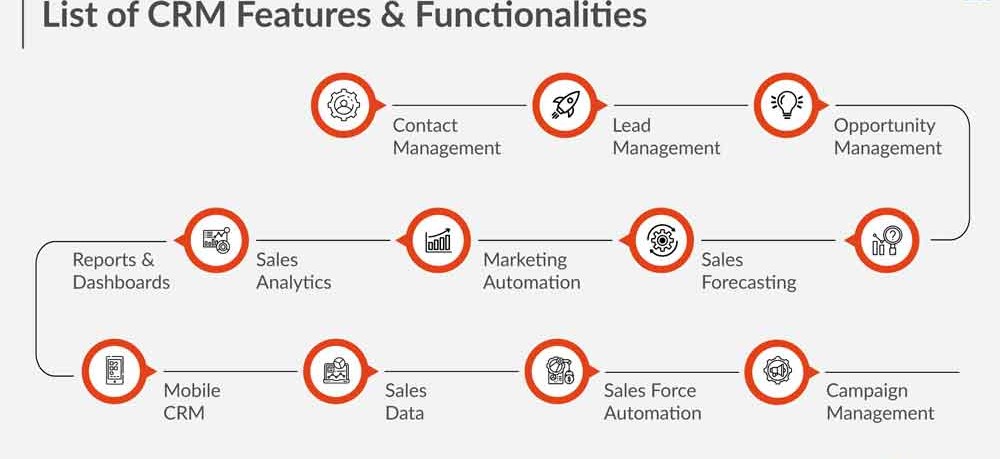
Workflow and Approvals
Streamlining workflows is one of the fastest methods for your firm to become more efficient. CRMs may help with optimization by automating formerly manual operations like data collecting, data analysis, marketing campaigns, and other duties. They also provide data and analytics to assist customers in identifying and improving problem areas.
CRM Data/File Storage
Data must be correctly kept in order to maximize its utility. One of CRM’s primary characteristics is a patented technique of data storing that allows users to retrieve information quickly. CRMs also have measures in place to preserve and backup this vital information, preventing data loss and security breaches.
Sales Performance Management
Sales performance management, among other CRM system capabilities, provides a number of advantages to sales teams. Managers can quickly identify which components of the sales team are functioning well and which need to be improved.
Call Center Automation and Integration
The ability to operate your call center from your CRM UI and connect any third-party software into a unified platform is one of CRM’s primary benefits. The fewer systems you utilize, the less likely you are to become confused and lose knowledge.
Chat integration
For a modern user, the chat tool is invaluable. You can talk with workers, partners, and give customer assistance all from the same UI by integrating a chat tool like Olark or LivePerson right from your CRM.
Web Analytics Integration
Integrating web analytics gives you more than just information about who visits your site. It analyses raw data, detects problem areas, makes recommendations for improvement, and gives you insight into how your users interact with your website. CRM solutions make it simple to collect and retrieve these data from your user interface.
Benefits of using CRM
Improve customer service
CRM keeps track of all of your connections and gathers lead and customer data to create profiles of everyone you deal with. This allows you to quickly access critical information about client behavior, such as purchase records and past discussions with contacts via various channels.
Customers won’t have to tell you their experiences again and again, and you’ll be able to solve concerns more efficiently and effectively, resulting in increased customer loyalty.
Increase sales
Streamlining and refining the sales process, as well as creating a sales funnel, automating processes, and evaluating sales data are all things to consider. Because they can produce an increase in revenue and sales productivity.
All of your customer-facing phone, chat, social media, and email interactions can be accessed from one location with CRM. Building a repeatable, proven sales process and delivering the correct message on the right channel at the right time can help you close more sales.
Retain customers
Customer retention and churn rates are critical determinants of a company’s success. Customer turnover is a key roadblock to expansion. By allowing human agents to defuse situations, CRM solutions like sentiment analysis, automatic ticketing, and customer support and customer service automation may substantially boost your retention. Customer life cycle analytics solutions can show you when churn occurs and why, allowing you to identify and fix pain areas.
Improve analytics
Analytical CRM technologies make your data accessible, understandable, and useful for your organization. All of your sales, financial, and marketing data flow into CRM to become visible with data mining and data warehousing. Customer acquisition, retention, and improved data management are the results.
Better knowledge sharing
Two key time wasters are miscommunication and a lack of information sharing. You’re wasting a lot of time every week when workers spend time self-learning to perform things that other team members already know how to do or working on repetitive activities.
Collaborative CRM technologies may help you streamline your teamwork by allowing you to create a knowledge base, define best practices procedures, and communicate with team members without friction.
Customer Relationship Management of MIYN
When it comes to CRM in Australia, you cannot ignore MIYN. Either you are looking for a CRM in management or you need it for increasing sales, MIYN is the best option. It has all the necessary features that will help your business to grow. Let’s have a look at the most important features of consumer relationship management of MIYN.
Manage contacts
Through MIYN you can collect the information of all clients on one single dashboard. And it will also store all the previous transactions of those clients. It will keep the track of documents, in case you have shared any.
And of course, it will keep an eye on all the conversations with those clients. You can use those chats to improve future communication to close more sales.
Reports and Dashboards
An effective dashboard should highlight all the activities of your business. And the dashboard of MIYN is easy to navigate and understand.
The dashboard displays reports of lead tracking. Moreover, it displays the total number of chats, closed quotations, and total files sent or received. These stats will help you understand the progress of your business.
Chat integration
Chat is an essential part of CRMs. It allows you to connect with clients quickly. Moreover, if a CRM offers a chatbot then it becomes more useful. Because the chatbot will allow you to communicate with customers 24/7.
MIYN allows you to save your auto chat. The bot will use this saved chat to reply to your customers. Thus you will know which messages are being used by the chatbot.
What else MIYN offers?
MIYN is just not a CRM. It is a complete business development tool. So, if you use MIYN then you will not have to use any other tool. MIYN is providing the following that will help you to grow.
Online appointment
Booking is the most important step towards closing sales. But sometimes you may forget about appointments or your clients can ghost you. If you have an assistant then you will be able to attend all the meetings. But what about your client’s side?
This is where booking software comes in. MIYN has the perfect online booking software. It is ideal because it allows your customers to select appointment slots. Also, it continuously gives you and your clients reminders about coming meetings.
Thus there are fewer chances of losing clients. Moreover, they can even cancel the meeting without giving you any problem. As that slot will be used by someone else.
Landing pages
Landing pages have prime importance when it comes to websites. If you have an engaging and powerful landing page your sales will rise. But a landing page without powerful content and design will stop the growth of your business. Hence you should look for perfection in your landing page.
Fortunately, you don’t have to worry about creating a landing page. As MIYN is providing you with perfect landing pages. The MIYN’s landing pages have interactive design and powerful content that will take your business to new heights.
Chat
Live chat is another powerful tool for online businesses. 76% of the customers claim that live chat helps them to make a decision for purchasing items. So, you should integrate live chat on your website.
Support of MIYN team
The MIYN’s team is always ready to help you grow. No matter what your query is, we try to solve it within 24 hours. Moreover, you can contact us through email, live chat or directly call us.
What are the features of MIYN’s premium plans?
For increasing the engagement MIYN has the following features:
- Scheduling/Booking
- Staff
- Services
- Services Category
- Website Popups
- Instant Messages
- Get Directions
- Click to call function
- Documents Sharing
MIYN will nurture your business through the following features:
- Real-time Chat
- Appointment Calendar
- Automated Reminders
- Detailed Analytics
To close more sales you will find the following features:
- Landing Page
- Subscription Management
- Custom Page URL
- Support
Benefits of choosing MIYN
If you choose MIYN as your CRM or business tool you will enjoy the following benefits.
- You will be able to grow your business
- It will be easier to book appointments
- It will help you to keep an eye on your customer’s behavior.
- MIYN allows you to communicate with your audience 24/7.
- It does not have any learning curve.
- MIYN is one perfect solution to all problems.
Pricing
You may think that it will be an expensive tool. But you are wrong. It is indeed an all in one package but it has a very pocket-friendly budget.
You can enjoy the basic plan for just 19 dollars monthly. And the advanced version has a fee of just 29 dollars monthly.
Conclusion
Well, online business is indeed completely different from traditional business. You will need to adapt different strategies for making your online business successful. But if you are unaware of these strategies then you will not be able to proceed in this modern trend.
One of the most useful tools is CRM. There are many separate CRMs available in the market. But it gets more wonderful if one tool can provide you with more than one benefit. Such a tool will help you grow faster. As you will only have one dashboard with all the information. And it is also cost-effective.
Get Started freeFortunately, we have MIYN for you. It has all the tools that will help your business to grow. That is appointment booking, live chat, landing pages and consumer relationship management.
Furthermore, it also has a one-month free trial. In this month you will not be charged anything. Once it can satisfy you, you can go for the paid versions.
Frequently asked questions
What is the CRM definition?
The full form of CRM is customer relations management. Customer relationship management (CRM) is a set of techniques, methods, and technology that businesses employ to manage and analyze customer interactions and data throughout their relationship with them.
The purpose is to strengthen customer service relationships, encourage client retention, and increase sales. CRM systems collect data of customers across several channels, or points of contact, with the firm, such as the company’s website, phone, live chat, direct mail, marketing materials, and social media. CRM systems may also provide extensive information on consumers’ personal information, purchasing history, buying preferences, and concerns to customer-facing employees.
Who can use CRM?
A CRM system’s strongest feature is that it may help every organizational unit, from sales and customer support to recruiting, marketing, and business development. External interactions can be better managed with good CRM software.
CRM benefits include storing all customer information in one place, tracking service concerns, recognizing sales possibilities, and managing marketing campaigns, to name a few.
CRM makes it easier for users to cooperate on multiple processes and enhance productivity since it enables easy access to data. CRM’s suitability for enterprises of any size is another major reason in its favor.
Why do companies need CRM?
CRM enables businesses to improve and strengthen their client connections. CRM software, when properly deployed, guarantees that each stage of the customer engagement journey runs smoothly and effectively, thus improving a company’s overall performance and profitability. CRM systems gather critical customer data from a variety of sources and utilize it to strengthen client relationships.
Customers can interact with you by email, text message, or by making a request online, among other methods. CRM software may help consolidate customer information like purchase history, pertinent personal information, and even analyze purchasing behaviors and patterns. As a result, you may position items and services that they are likely to benefit from and be interested in.
How does CRM help my business to grow?
CRM is perfect for every sort of organization, regardless of industry or size, and it plays a critical role in all areas of a company, not just sales and marketing. CRM is concerned with the acquisition, development, and retention of customers from the standpoint of company development.
Information may be freely shared across the organization to better serve customers, depending on how the CRM is linked with other business processes and departments. Increased sales, greater staff productivity, enhanced profitability, lower expenses, and more customer retention through improved customer service channels are some of the advantages of CRM software for businesses.
How do CRM systems work?
CRM systems are jam-packed with tracking tools that keep track of a slew of online consumer interactions. CRM also automates regular procedures and gives managers with tools to track and measure the company’s performance and efficiency. Most For instance, CRM software may remind you of activities that must be completed by a certain date. You can programmer it to do things like send emails and make phone calls regularly.
Everything you do with the CRM is tracked, allowing you to build better action plans to close any prospective sales. Some CRMs also provide analytics features, allowing users to track the effectiveness of different lead generation and conversion initiatives.
How do CRMs boost sales?
Using a CRM streamlines the whole sales process, allowing your salespeople to complete deals more quickly and with less effort. Agents have more time to connect with consumers since many of the chores that clog everyday workflow are automated. Your agents will know exactly what their consumers want and when they’re most likely to want it since they’ll have all that data at their fingertips.
